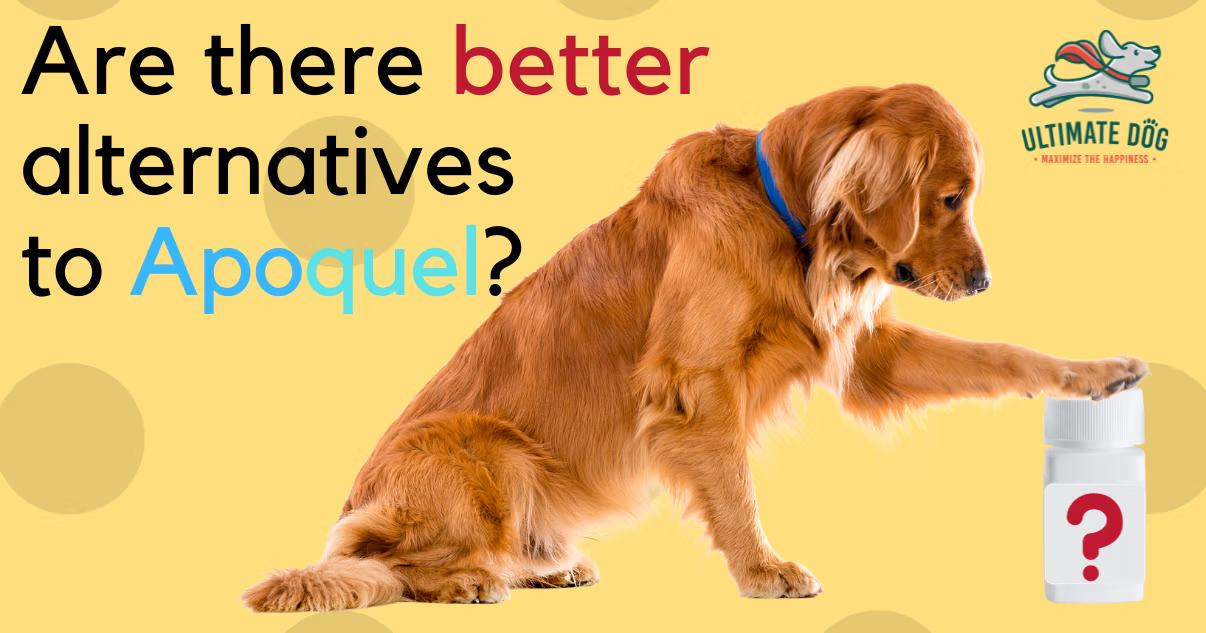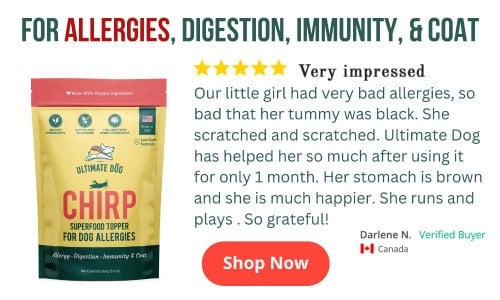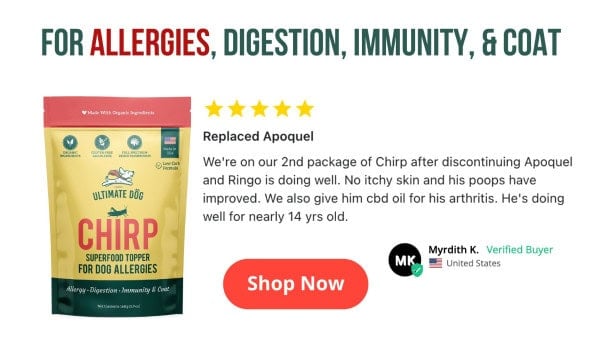I remember when Apoquel first hit the market. For dogs with chronic allergy dermatitis and uncontrollable itching, it was a godsend. And for one of my training clients, in particular, it was life-changing.
He was a brindle boxer with a spastic personality and a bag of health problems. Among his many ailments were chronic pruritus, atopic dermatitis, and frequent hot spots. He was a mess.
Apoquel changed everything. Within just a couple weeks, his skin looked less inflamed and the constant itching was noticeably reduced. But that wasn’t the only change I noticed. He also bloated up, lost his energy, and became a mere shadow of the dog he once was.
Unfortunately, his story is not unique.
So many dogs and their owners find themselves in a catch twenty-two with Apoquel. The medication works brilliantly to stop itching, but always at a cost. Whether it’s to your dog’s health or your wallet.
It’s these reasons that drive many desperate owners to consider alternatives to Apoquel. Unfortunately, it isn’t as easy as picking up a cheaper pill with fewer side effects. But the good news is, there are safe and effective alternatives out there.
In this article, we’ll look at the potential problems associated with Apoquel and discuss the effectiveness of alternate routes to cure your dog’s dermatitis, including natural remedies, possible Apoquel substitutes, and addressing the root cause of the issue.
Side Effects and Other Pitfalls of Apoquel
Apoquel isn’t a drug meant for acute dermatitis or short term use. It’s a drug vets turn to when the cause of their patient’s itching can’t be easily determined or has persisted through other treatment options. Once a dog is started on Apoquel, they are usually stuck on the drug for life.
Before you make such a monumental decision about your pup’s healthcare, it’s worth looking at the risks associated with this drug.
Known Side Effects
While vomiting and diarrhea are common with many meds, including Apoquel, this drug also comes with its own special list of worrisome side effects.
Apoquel works by disrupting kinase pathways within your dog’s immune system. While this leads to a reduction in skin irritation and itchiness, it also interferes with the immune system’s ability to complete other important tasks as effectively.
Just like immune-suppressing drugs used in humans, Apoquel is linked to an increased rate of infection in dogs. The most common infections are Demodex mange, ear infections, and pneumonia. It is because of the potential for serious infection that this drug cannot be used in dogs under a year of age who naturally have weaker immune systems.
In all dogs, there is also a potential for bone marrow suppression and reduced white blood cell count.
But kinase pathways aren’t just isolated within the immune system. They play a huge role throughout the body. That fact might explain why more surprising side effects like anorexia, lethargy, and increased cholesterol and blood lipase are often seen in dogs on Apoquel.
The Cancer Link
We often think of our immune system as being responsible for fighting invaders from the outside world, but our immune system also plays a key role in fighting cancer within our bodies. And your dog is no different.
By far, the most worrisome side effect of Apoquel is the potential to increase cancer rates.
The third listed side effect on the box explains that Apoquel may “exacerbate neoplastic conditions.” This means that in laboratory tests, this drug was found to make preexisting cancers worse. This shouldn’t come as a huge surprise given the way this drug functions. By disrupting the normal activity of the immune system, Apoquel reduces your dog’s ability to fight cancer cells.
While there is no evidence that Apoquel itself causes cancer cell growth, it’s not much of a leap to say that your dog is more likely to develop cancer on the drug than if they weren’t taking it. In fact, in one long term study, 5% of dogs on Apoquel were diagnosed with some form of cancer within 392 days of starting the drug.
This number is almost equal to the percent of dogs in most studies that experienced vomiting while on the drug, a side effect that is considered common with Apoquel.
Increased cancer rates may be an acceptable risk for a drug to prevent organ rejection, but it is up to you to decide if this risk is worth it to help your dog find relief from chronic itching.
Becoming Dependent
As disturbing as the side effects of Apoquel seem to be, the real threat of this drug in my mind is how addictive it is to your dog’s system.
Apoquel is not a drug meant for acute conditions, but instead for skin issues that have typically plagued a dog for a long time. For that reason, most dogs are prescribed this drug without any expectation that they’ll ever be taken off of it. It makes sense when you consider a dog like my former client, the brindle boxer. Here was a pooch that had been struggling with chronically itchy skin for years. And his owners finally had a treatment that worked, so why would they stop using it?
Unfortunately for them, the usefulness of the drug is actually what forced them to stop using it, at least briefly. Shortly after Apoquel hit the market, the demand for the drug overtook Zoetis’ ability to produce it. Thousands of dogs were forced off the drug cold turkey. I remember how ferociously the irritated, inflamed, and itchy skin returned for that poor boxer. It was as if his condition was worse than it had been before the medication.
It turns out that this wasn’t just a matter of perception, either.
Apoquel isn’t a cure for the underlying cause of atopic or allergic dermatitis. Instead, it is a bandaid that forces your dog’s immune system to compensate for the destruction it causes. And once the bandaid is removed, not only will the itch return, but your dog’s entire immune system can fall into chaos as the newly unimpeded kinase pathways attempt to reconcile with the restructured system.
If your dog’s dermatitis seems too unbearable now to attempt another form of treatment, take a moment to consider that it will likely be far worse after a few months or years on Apoquel.
It’s Pricey
While the potential for cancer growth and dependence are risks all owners should consider, it’s the price of Apoquel that often leads owners to hunt for an alternative.
Little has changed in the six years since this drug came on the market. It is still a revolutionary and unrivaled treatment for severe itching that you can get only with a prescription from your vet. And the price more than reflects Apoquel’s dominance over the market.
The go-to choice for allergic dermatitis used to be prednisone, a drug that costs on average 800% less than Apoquel. But when comparing the effectiveness of the two treatments, there’s generally no contest.
When owners realize they may be paying this inflated price for the rest of their dog’s life, they often ask: Is there a generic for Apoquel? The short answer is a resounding no. In fact, the patent doesn’t expire in the US until 2026, making it unlikely we’ll see anything to rival this drug in the near future.
Your options for Apoquel substitutes are therefore limited to the old standbys for allergy-induced itchiness.
Atopica was most vet’s go-to choice for atopic dermatitis before Apoquel came along. Unfortunately, the reason it was ditched in favor of the new drug was because it came with its own set of disturbing side effects, most even worse than what we are now seeing with Apoquel. The price also rivals Apoquel’s, making this drug a poor substitute all around.
Prednisone and other steroids are options that have long been used to treat itchy and inflamed skin. Unfortunately, these drugs have less of a desired effect than Apoquel and are not recommended for long term use.
When it comes to Apoquel versus Benadryl, chlorpheniramine and other antihistamines for dermatitis, there really is no contest. Antihistamines are considered to have little to no effect on itching in most dogs and are rarely recommended to treat allergic dermatitis. However, they are significantly safer to use than other drugs and might be worth a try for the desperate owner looking for a short term solution while they employ one of the Apoquel alternatives listed below.
5 Safer Apoquel Alternatives
1. Addressing Environmental Allergens
As I mentioned above, dermatitis is never a condition in and of itself, but always the symptom of a larger issue. Figuring out what that issue is and treating it rather than treating just the symptom is much more likely to lead down a path towards a cure for your dog’s itching.
And considering that 70% of canine skin conditions are allergy-related, addressing environmental allergens is a good place to start. Of dogs who do suffer from allergic dermatitis, around 90% of them are reacting to an allergy in the air or from surface contact. The most common allergens are dust mites, protein in flea saliva, and pollen.
If your dog only suffers from itchy skin in the spring and fall, then they probably have seasonal allergies caused by plant pollen. At least with this diagnosis, you have the option to use drug therapy sparingly. But remember, drugs like Apoquel often create dependence and are not easy to take your dog off of.
Instead of turning to drugs, there are other options available that can significantly reduce and even cure your dog’s underlying allergies.
Using high-powered air purifiers indoors, changing HVAC filters frequently, and reducing your dog’s contact with known allergens like grass, can help reduce symptoms significantly. But for dogs with highly sensitive skin, multiple allergies, or severe allergies, this might not be enough.
In this case, you may consider immunotherapy to potentially cure your dog’s allergies altogether.
Immunotherapy works the same way in dogs as it does in people. Tests are done to determine what your dog is allergic to. Then your dog is given a series of shots or oral drops over the course of days to weeks to slowly introduce the offending allergen to their system. Over time, the number of doses is decreased and the amount of allergen per dose is increased.
In about 70% of dogs, the immune system will become accustomed to the allergen and stop reacting to it, leading to a reduction or complete disappearance of dermatitis.
2. Changing Your Dog’s Diet
So what about the 10 to 15% of dogs who suffer from allergic dermatitis but aren’t reacting to environmental allergens? These dogs are most likely allergic to something in their diet.
While true food allergies are relatively rare, food sensitivities and intolerances are far more common and can also lead to red and itchy skin in dogs. If you believe your dog’s dermatitis is caused by something in their food, your best option to find relief is an elimination diet.
In an elimination diet, you will remove all possible allergens from your dog’s diet and then slowly reintroduce foods one at a time after symptoms have resolved. So how do you determine what the possible allergens or intolerances are? Easy, any food ingredient your dog has been exposed to in the last couple of years is a potential allergen.
The most common dog allergies, in order, are beef, dairy, chicken, wheat, soy, lamb, corn, and eggs. But your dog can become allergic to any food they have previously been exposed to.
Look at the ingredients label on your dog’s food bag. Write down every whole food ingredient you see. While it is possible for a dog to be allergic to synthetic vitamins, preservatives, and other minor ingredients, it is less likely. Add to that list any foods your dog has gotten as a treat, licked up off the floor, and flavors included in their medications or supplements.
This is your list of foods your dogs cannot have for the next few months. Your challenge now is to find a dog food that does not contain ANY of these ingredients. I would recommend looking for a limited ingredient diet that contains only one protein and one starch. If your list includes multiple common proteins and veggies, you may have to hunt for a food with less common ingredients like venison and sweet potato or rabbit and oatmeal.
Slowly switch your dog from their original food to the new food over the course of a few days. Once they are completely on the new food, restrict your dog’s diet (treats included) to only items NOT listed on the potential allergens list you created.
You will need to continue this restricted diet until your dog’s symptoms clear. For skin allergies, that often means waiting two to three months. If your dog’s symptoms don’t improve in this time, try a diet with different ingredients. If there is still no improvement, it is unlikely you are dealing with a food allergy or sensitivity.
Once symptoms have cleared, then you can choose one food from the restricted list to add back in. Feed only this modified diet for at least a month or two. If symptoms return, you know your dog is allergic to that reintroduced food. Remove the food from their diet completely, wait for symptoms to resolve, then try another food from the list. Ideally, after multiple trials, you will be able to find a complete and balanced diet with multiple proteins and starches that your dog can eat without showing any symptoms of allergic dermatitis.
Even if your dog doesn’t suffer from allergies or intolerances, food may be to blame. Poor quality diets can lead to a dry, brittle coat, and itchy skin. If your dog is on a less than optimal diet, try changing their food to one that contains multiple quality named animal ingredients at the beginning of the list, no filler ingredients like corn or soy, and no synthetic dyes or preservatives. Look for a food that has at least 25% protein and is high in healthy fats as well.
Often, this change alone can make a huge difference in the health of your dog’s skin and coat.
3. Ruling Out Infections and Parasites
The first step in your dog’s itchy skin journey probably included a battery of tests to rule out parasites like fleas, mites, and other skin infections. (If it didn’t, this is definitely something you should do now.) But often, these tests miss common causes of dermatitis.
Flea allergies are most common in dogs who only rarely have fleas, and it only takes one bite to set off a week’s worth of itching misery. This minor or intermittent degree of infestation can be easily missed in the vet’s office and should not be ruled out just because flea dirt isn’t visible.
Even mange can be misdiagnosed. Some mites live so deep within the dermal layer that they aren’t readily detected through normal skin scrapings and may take repeat tests to diagnose. If your dog has other symptoms of mange, but your original test was negative, you may want to talk to your vet about additional tests.
Some dogs, especially those with thyroid problems and other environmental allergies, can even be allergic to the staph bacteria. This microbial is present on most surfaces, including a healthy animal’s skin.
This and many other infections that cause allergic reactions can only be determined through blood tests that detect antibodies. This may be a worthwhile step to pursue for your dog if there is a possibility their allergic dermatitis is caused by an environmental or contact allergen or infection.
Sometimes vets will put a dog on a course of antibiotics to rule out bacterial-induced dermatitis. While this can be a helpful diagnostic tool, keep in mind that some infections take multiple rounds of antibiotics to knock out and that yeast infections, often made worse by antibiotics, can also cause itchy skin.
The most important thing to remember here is to work with your vet and exhaust your options before ruling out an infection, parasitic or otherwise, as a cause of your dog’s itchy skin. You may even consider taking your dog to a specialized holistic-minded veterinary dermatologist.
4. Supplements
Just as switching your dog to a higher quality food can help fight itchy skin, so can some supplements.
Fish oil is one of the first supplements that comes up when talking about itchy skin. That’s because this oil is full of omega fatty acids. Omegas are key to your dog’s skin and overall health and can be especially effective in relieving itch. In fact, about 20% of dogs with dermatitis show reduced itching with the use of an omega supplement alone. Since these fatty acids are a healthy addition to any dog’s routine, there really is no downside to giving them a shot.
Digestive enzyme and probiotic blends made specifically for dogs can also be helpful in relieving the itch, especially if your dog suffers from an unknown food sensitivity or intolerance.
Enzymes help break down specific foods in your dog’s stomach. If your dog lacks a certain enzyme or does not produce enough on their own, that food can move through the system undigested and cause unnecessary immune response or nutrition deficits that in turn cause itchy skin.
Similarly, probiotic organisms help break down particles in the gut that your dog is unable to digest themselves. Healthy intestinal flora is key in helping your dog absorb needed nutrients, including many that are important for skin and coat health.
Yucca and quercetin are also great natural alternatives to Apoquel. Yucca has an effect similar to steroid drugs without the harmful side effects. Quercetin is a plant derivative that acts as a natural antihistamine and is a great option for dogs whose itching is reduced by Benadryl.
5. Topical Remedies
There are a number of topical balms and ointments marketed to dogs with itchy skin. Many owners find these products useful, especially for flare-ups and treatments for hot spots.
But you don’t have to spend a fortune on pre-made remedies to find relief for your pup’s itchy skin. Many common items, maybe even some in your pantry right now, can be used to tame your dog’s itchy skin.
Coconut oil is a natural skin soother with antibacterial and healing properties. It can be applied directly to the skin as is or mixed with a little lavender or peppermint essential oil for a truly relieving skin treatment.
Green tea, chamomile tea, baking soda, oatmeal, and apple cider vinegar are all natural anti-inflammatory products that can be mixed with water for a therapeutic soak. While it may take some work to get your dog to stay still long enough to reap the benefits, they’ll likely thank you for that tough love once they feel the relief.
Cure the Cause, Not the Symptom
While supplements and topical remedies are excellent options for soothing your dog’s itchy skin, keep in mind that they will not cure the underlying cause.
If you ever want your dog to live a life free from painfully itchy skin, and free from costly and sometimes dangerous medications like Apoquel, you have to figure out why the symptom exists in the first place.
My training client, the boxer, spent the first couple years of his life battling itchy, inflamed skin. Then the next half-decade fighting the side-effects of Apoquel and other drugs. What he needed was not a miracle cure for his dermatitis, but a diagnosis for what was causing the symptoms in the first place.
Whether you choose to use Apoquel, another drug, or a natural remedy to deal with your dog’s itching while you search for the underlying illness or allergy, just make sure you never stop searching. Not until the itching is gone for good.
Sources
Sally B. Cosgrove, et al. “Long‐term compassionate use of oclacitinib in dogs with atopic and allergic skin disease: safety, efficacy and quality of life”wiley.com, 16 February 2015.
Various. “Apoquel”drugs.com.
Karen A. Moriello. “Itching (Pruritus) in Dogs” merckvetmanual.com.
Various. “Canine Allergic Dermatitis: Causes and Treatment Options”animalmedcenter.com.
Ralf S. Mueller, et al. “Critically appraised topic on adverse food reactions of companion animals (2): common food allergen sources in dogs and cats”bmcvetres.biomedcentral.com, 12 January 2016.
Various. “Allergy Shots May Bring Relief to Itchy Dogs”vetmed.illinois.edu, 27 November 2017.
Cynthia Foley. “Will Your Allergic Dog Benefit From a Food Elimination Diet?”wholedogjournal.com, 12 February 2015, Updated: 21 March 2019
Various. “Natural Supplements for Dogs With Itchy Skin.” petmd.com.

Sara Seitz worked in the pet industry for over a decade. In addition to being a certified dog trainer, Sara gained experience working as the general manager of a dog daycare and boarding facility, as the creator and manager of a pet sitting company, as a groomer, and as a dog behavior evaluator. She also has a bachelors in animal behavior from CSU. Currently, Sara works as a freelance writer specializing in blog, article and content writing.






Leave a Comment